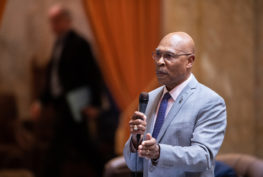The goal of ending homelessness is a noble one and must be addressed in a serious, evidenced-based way. The bill below takes a punitive approach to the problem of homelessness and does little to address the root causes of our state’s homelessness crisis.
Bill to watch: Republican bill to address homelessness
WHAT: Senate Bill 5656
STATUS: Scheduled for a public hearing in the Senate Committee on Human Services, Mental Health and Housing on Wednesday, February 8, at 1:30 p.m.
INTENT OF BILL:
- Attempts to end all homelessness in Washington state by 2018.
WHAT IT WOULD COST:
- While the Senate has not yet issued a fiscal note on the cost to implement statewide, the City of Seattle estimates that it will cost them $60 million implement changes from this legislation, and $64 million in ongoing costs each subsequent year.
WHAT THE BILL DOES:
- Criminalizes parents. Under this bill, parents would be guilty of a misdemeanor if they do not report their children as missing within 48 hours, despite national research that shows that the majority of youth return home within a week after a cooling off period. Misdemeanors are punishable with up to 90 days in jail and $1,000 dollar fine.
- Makes family reunification the primary goal for homeless youth. Reunification should be a goal when it’s safe and this section simplifies what are normally complex reasons for why a youth is homeless, including domestic violence and sexual assault.
- Eliminates services for young adults, ages 18-24. The bill eliminates the category of “young adults,” slashing services for this age group, including: age-appropriate housing, high school graduation support, job training, and other resources to help them successfully launch into adulthood.
- Criminalizes unsheltered homeless individuals. Unsheltered homeless camping would become a misdemeanor statewide. The provision does not require law enforcement officers to attempt to provide services before arrest, and would results in more people in jails, including those in need of mental health treatment.
- Changes definition of “gravely disabled” to include substance use disorder. Under this bill, a person would automatically be categorized as “gravely disabled” if he/she is homeless for a year and actively uses heroin. This would greatly increase the number of people who would be eligible for detention beyond capacity for involuntary treatment system, and requires increased funding for detox facilities and law enforcement to treat and transport individuals.
QUOTE FROM SEN. JEANNIE DARNEILLE: “Our state’s homelessness crisis affects real people, who deserve real solutions. To criminalize homelessness, and to criminalize parents, is going to make the situation much worse. We need to give our state’s most vulnerable citizens a helping hand-up, not punish them. This dangerous bill only serves to put more homeless youth at risk, and criminalizes adults struggling with mental illness or substance abuse. We must to better.”




